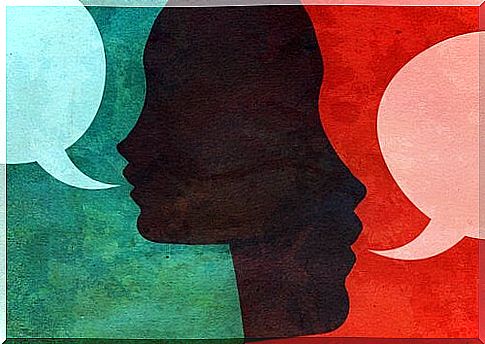Genuine People Speak Without Fear

Genuine people speak without fear. They say what they think and act accordingly. To do this, however, they need to know how, when, to whom and why to tell things. They must know how to dominate the spaces and the tone of voice. In conclusion, they must be able to control what are known as social skills.
Social skills are more than just the expression of an opinion. They are used to interact and relate to others in an effective and satisfying way. They are our way of showing ourselves to the world, they constitute our social identity. They show our essence as human beings.
In addition, the lack of social competence can represent a very important deficit, even going so far as to be at the root of many psychological disorders. For this reason, they are not only important if we want to be authentic people, but also to achieve psychological well-being and a correct relationship with what surrounds us.
Authentic people know how to listen
Authentic people think before they speak and listen to their interlocutor carefully. They are empathetic with each other during a conversation. They know very well that two people don’t necessarily have to share an opinion, but that everyone has the right to be heard with the same respect.
Knowing how to listen is an art and a skill that can be learned. Knowing how to listen means, in addition to waiting and responding to what we are told, respecting the turn to speak and maintaining an adequate body posture. Some of the secrets to being a good interlocutor are the following:
-
Keep non-verbal language open
: use eye contact and relax your facial expression. Nod occasionally to let the other person know that you are paying attention to him. Don’t cross your arms or even your legs, as these small physical barriers can discourage the other person from approaching you.
-
Don’t interrupt the conversation
: You may be tempted to interrupt the other person out of a desire to show that you understand the message or to explain to them why you think they are wrong, but this can be seen as rude. Out of politeness, we must bite our tongue until the other person has finished speaking.
-
Strengthen the dialogue
: the most powerful word in a conversation is: “tell me”. People feel good when you ask them relevant questions and actively listen to their answers. This will show the other that we are understanding what he is telling us, and he will empathize with us.
-
Give up the floor
: a dialogue is not a monologue. Involve the other person in the conversation through questions or propose topics of interest to talk about, without, however, ever monopolizing the conversation.

Genuine people don’t always please others
Authentic people don’t always please others, they know how to say “yes” or “no” according to the occasion. They know how to agree and disagree in any situation, and when they do, they don’t feel guilty. They manage to control that part of social skills known as
.
Assertiveness is a form of communication that consists in defending one’s rights, expressing one’s opinions and making suggestions honestly, without being aggressive or passive; respecting others, but, above all, respecting one’s own needs.
This is a very important skill, because expressing your true feelings and standing up for your rights can be incredibly comforting. When you say what you want, regardless of whether you get it or not, you can live more authentically and happily.
The first step to being more assertive is to recognize what you are feeling and what you want to communicate. If you are honest and understand that the other person cannot read your mind, nothing you say can be wrong. Just remember to always respect the turn of the word and that what you will be defending is “your truth”, not the “absolute truth”: basically you always start from your own point of view, which has exactly the same value as ours interlocutor.
As for the tone of the voice, keeping it at an adequate level, without shouting, helps to affirm one’s opinion. Keep in mind that it is not by shouting that you will be right: on the contrary, shouting makes the message lose value. The same thing happens with regard to physical distance: getting too close can make you appear aggressive and make communication difficult. Always respect personal space.

Social skills are learned
If you want to be a real person, but are unable to control any of the skills described in this article, don’t worry – social skills are learned. These are not innate abilities, they are acquired through observation and experience. This development basically occurs in the period of infancy, and for this reason the first years of life are extremely important for learning these skills.
This does not mean, however, that they cannot be learned even in adulthood. In fact, psychology provides several programs to teach social skills. Most of them are structured by combining direct social experiences, imitation and reinforcement.
If you want to be authentic people, but you do not have or do not know how to control social skills, rely on a psychologist and follow what we have told you in this article. Only then will you finally be able to consider yourself authentic people, capable of speaking without fear.









